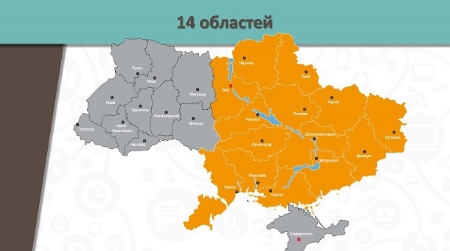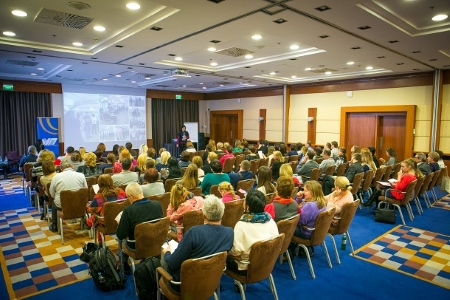
The project ‘Media literacy for citizens’ was being carried out from July, 2015 till March, 2016 with the support of the Department of Foreign Affairs and Trade of Canada in partnership of three organizations: the Academy of Ukrainian Press, IREX and StopFake. The organizers pointed out that the main project goal was increasing civil resistance to a destructive impact of false information.
The basic way of media literacy improvement were trainings held in 14 regions of Ukraine. A handbook with the slogan ‘Do not sink in the information rains’ containing the model lessons and exercises on different topics as well as comments to video presentations was also published. Its preparation was the part of project realized by Ukrainian media experts, teachers, representatives of AUP, IREX, StopFake. The contents of handbook correspond to the structure of trainings which enhanced the ability of citizens to define reliable information sources and increased the demand for accurate information. The project focused on the Eastern and Southern regions in the first line.

Totally 14 803 citizens took part in trainings (data for March, 14, however, a final figure will be higher as a part of questionnaires are being processed)
In March, 6-7, trainer-participants from different regions came to Kyiv from different regions. The purpose was to exchange the experience, tell about the problems occurring while learning, and discuss the perspectives of media literacy development among different groups of people. ‘Experience exchange fair’ took place at the event where about 80 presentations about the project outcomes were introduced.
Most of trainers (428 involved in project) were people working at secondary and higher school, institutes for continuing teachers’ training, libraries, media outlets and civil society organizations. One of the project stages was actually training for trainers conducted by the group of ‘master trainers’. It was mentioned by trainers at the presentations that the audience was motivated by message ‘do not let them cheat on you’ and ‘how to know the truth’. Training participants were also interested in applying this knowledge in practical life.
Hate speech use and television reports caused frequently lively debates. ‘Presence of stormy discussions is definitely one of the project achievements, - Valeriy Ivanov believes. – It means that we managed to reach those people with a different point of view, including those pro-Russian. If such a different audience participated in trainings, it is a success’.
Trainers noticed that they did not aim at changing the opinions, but direct them to critical evaluation of information. They say, it is important, firstly, to cover all the regions in future and, secondly, to involve the audiences which are not interested in media literacy (those who are interested will come anyway). Regional trainers pointed out that it is necessary to train more media literacy such people as members of the armed forces, internally displaced people, housekeepers, mothers of small children, parents of schoolchildren, citizens of the border zone with occupied territories. In order to engage them, the information campaign was launched consisting of a social video and billboards. A social video was broadcasted in Feb. on TV channels 1+1, TET, 2+2. Billboards were arranged in 14 target regions (in regional centers and some towns). According to Lyubov Vasylchuk, IREX program manager, a social video is currently broadcasted in Kyiv subway and in social media, and StopFake is preparing a learning video on media literacy that will be distributed in social networks in the middle of March.
Author: Media Sapiens